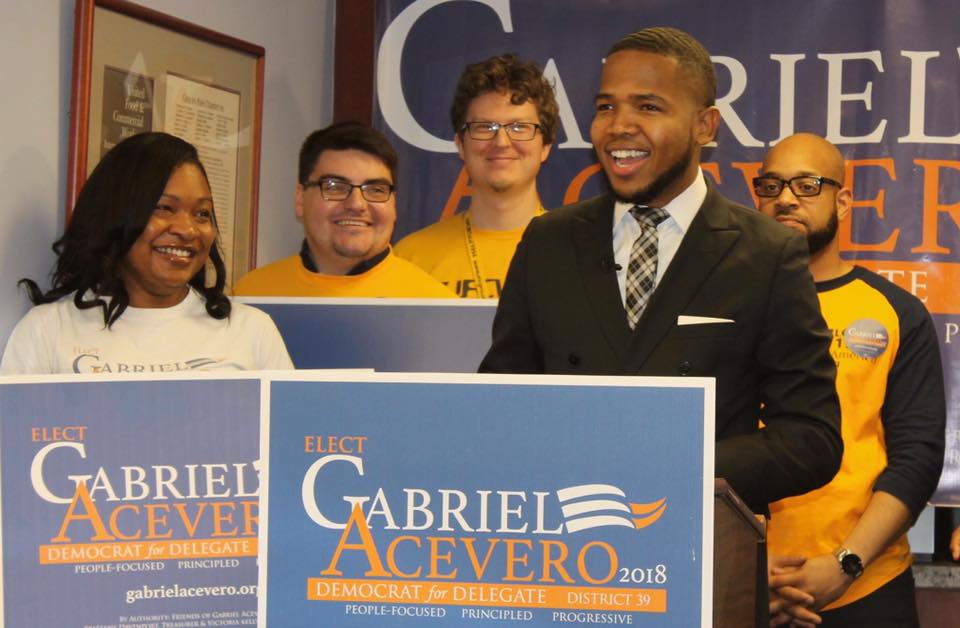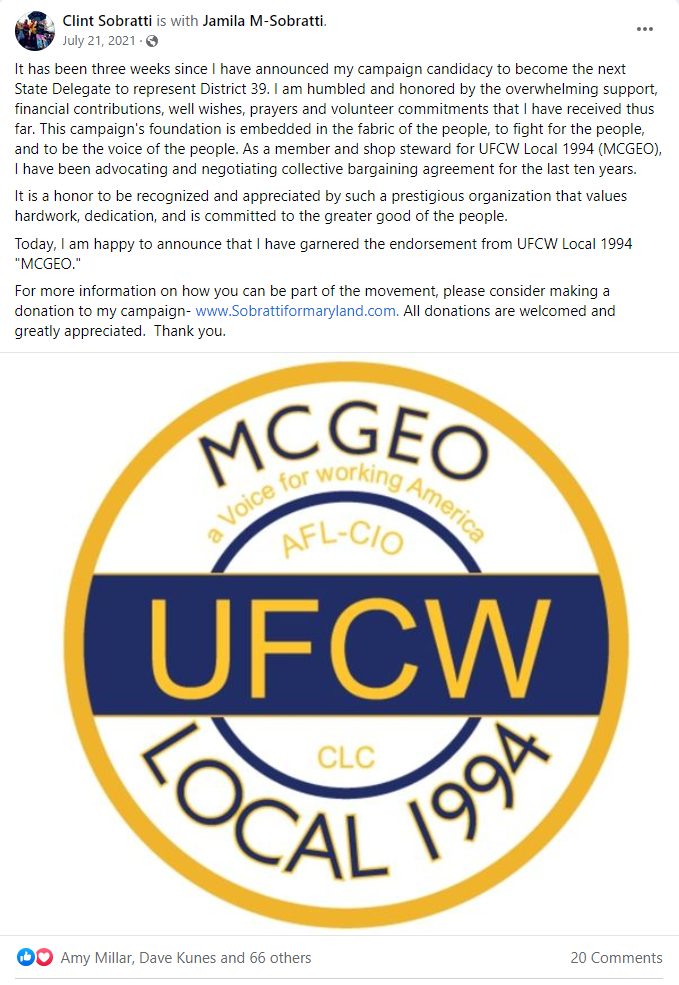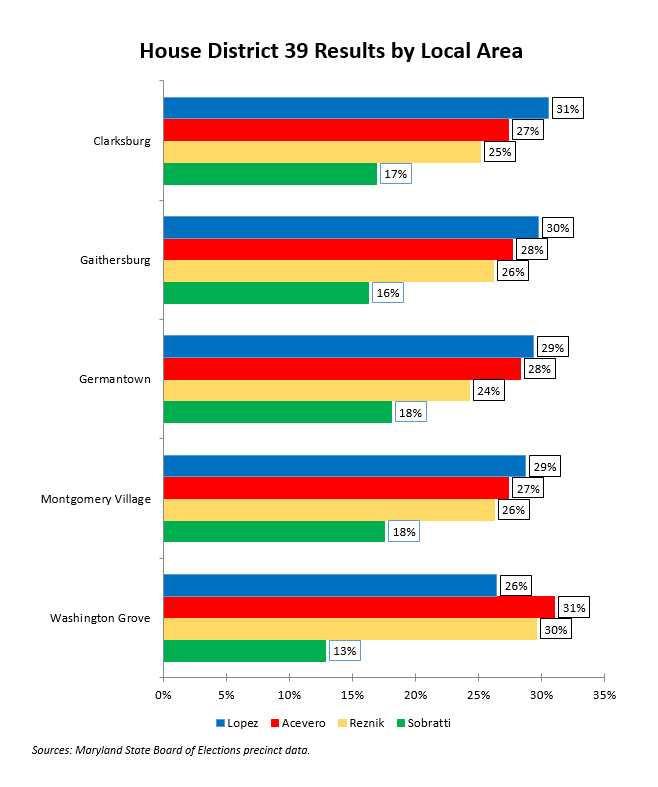By Adam Pagnucco.
Back in 2018, MCGEO employee Gabe Acevero was elected to the House of Delegates in District 39. Two years later, Acevero and his employer disagreed on the issue of police reform. One of MCGEO’s key allies is the local police union and MCGEO itself represents correctional officers and sheriff’s deputies. MCGEO President Gino Renne fired Acevero after a nasty confrontation, drawing coverage in the New York Times.
But the issue did not end there. Acevero did not just go against Gino; he blasted his former employer publicly and triggered an avalanche of negative press coverage. Acevero, who is Black, even played the race card on Gino, telling Maryland Matters, “I’m appalled that a UFCW affiliate with a majority minority membership would violate a collective bargaining agreement and collude with the FOP to strong-arm an elected official.” Acevero later sued the union in federal court but withdrew his case.

Acevero speaking in 2018 after being endorsed by MCGEO. Credit: Acevero’s Facebook page.
Anyone who has ever met Gino knows he would never take this lying down, so another MCGEO official, union vice president Clint Sobratti, began running for delegate in District 39. On top of that, the other incumbents – Senator Nancy King and Delegates Kirill Reznik and Lesley Lopez – decided to run with Sobratti on a slate to freeze out Acevero, whom they had come to dislike. Let’s remember that Gino had preexisting issues with two of the incumbents, having supported Saqib Ali against King in 2010 and famously threatened Reznik in 2018. But that was the past, and in a fight against a new enemy, old enemies can become new allies.
The plan to defeat Acevero quickly developed problems. First, Sobratti had run for office before, finishing last of seven candidates in the 2018 District 39 House race. Even with support from the incumbents and MCGEO, this created an impression of weakness that was hard to shed. Second, Sobratti struggled to raise money. The table below shows the fundraising of the four delegate candidates.

District 39 is not a great place to raise money. It lacks wealthy contributors who roam in abundance Downcounty. Reznik was the only candidate to break six digits for the cycle. As for Sobratti, he raised about half what Acevero did – not a good omen for his chances to knock him out. Also noteworthy is that Sobratti’s $18,000 of labor money came from MCGEO, UFCW Local 27 and the Empower PAC – all groups with ties to Gino.

MCGEO members pose in 2018 with an Acevero campaign sign. Credit: Acevero’s Facebook page.
Next came the endorsements. Sobratti was supported by MCGEO, the local AFL-CIO, Progressive Maryland, the career fire fighters and the grocery workers union, all organizations over which Gino wields some influence. But many other progressive groups defied Gino and supported Acevero, including MCEA, the Sierra Club, Casa in Action, SEIU Local 500, SEIU Local 32BJ, the Democratic Socialists, Our Revolution and Progressive Maryland (who also supported Sobratti and omitted Reznik). It’s no wonder that they did considering that Acevero was an incumbent with a progressive record, something that almost always brings endorsements from the left. Gino’s inability to control all of these other groups turned into a major problem as each endorsement for Acevero built momentum for the next one.

Sobratti announces his endorsement by MCGEO a year before the primary. Credit: Sobratti’s Facebook page.
One more factor was Congressman David Trone, whose district overlaps with District 39. Over the course of the cycle, Trone and his wife gave $12,000 to King and $5,000 each to Lopez, Reznik and Sobratti. That’s peanuts to Trone, who has long given millions to political races (including his own), but it was helpful to the incumbents – and Gino.
In the end, the order of finish was Lopez first with 29% of the vote, Acevero second with 28%, Reznik third with 25% and Sobratti a distant fourth with 17%. It gets worse. Sobratti finished last in every one of the district’s local areas and last in 30 of the district’s 32 voting precincts. (See my methodology post for definitions.) The chart below shows the candidates’ vote percentages by local area.

In viewing these results, consider that 41% of the district’s votes were cast in Germantown, 31% were in Montgomery Village, 22% were in Gaithersburg, 5% were in Clarksburg and 2% were in Washington Grove. That said, it hardly matters because Sobratti was not competitive anywhere.
And so Acevero has survived. Why does that matter? Gino is one of the most successful labor leaders in the history of Montgomery County and he has earned that distinction through his long history of intimidating politicians. Rarely if ever has he had a target like Acevero, a former employee who went against the union’s policy agenda, defied him in front of allies, attacked him in the press (with national coverage no less), used the race card against him, sued him in federal court and was utterly unrepentant. Given how Gino plays politics, he really had no choice but to try to take him out.
So Gino took his shot and the result was an easy win for Acevero. Every politician in the county witnessed it.
Time will tell whether this is forgotten or remembered.
